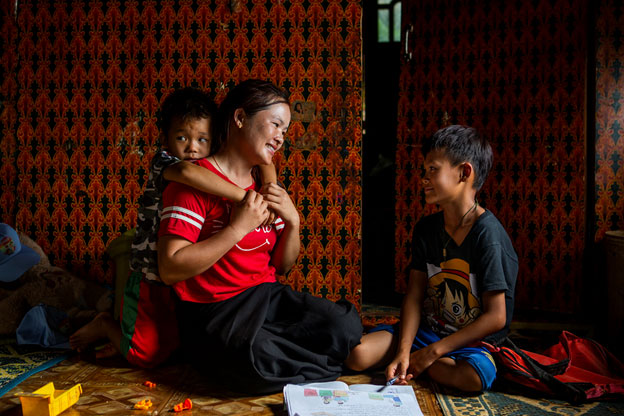By Oritro Karim
UNITED NATIONS (IPS) – Myanmar’s security situation has deteriorated significantly, with the nation still reeling from the devastating earthquake in March last year, and continued military offensives driven by the ongoing civil war. In 2025, the humanitarian crisis reached a critical turning point, with the United Nations (UN) underscoring a litany of severe human rights abuses inflicted on civilians by the military and armed groups.
On August 12, the Independent Investigative Mechanism for Myanmar (IIMM) released its annual UN-mandated report, stating that it had made significant progress in documenting human rights violations and identifying perpetrators. The report details ongoing atrocities, including the torture of civilians in military-run detention facilities, coordinated aerial strikes on schools, hospitals and homes, and the continued ethnic-cleansing of Rohingya refugees.
“We have uncovered significant evidence, including eyewitness testimony, showing systematic torture in Myanmar detention facilities,” said Nicholas Koumjian, Head of the Mechanism. “We have made headway in identifying the perpetrators, including the commanders who oversee these facilities, and we stand ready to support any jurisdictions willing and able to prosecute these crimes. Our Report highlights a continued increase in the frequency and brutality of atrocities committed in Myanmar.”
The report covers developments in Myanmar from July 1, 2024, to June 30, 2025, drawing on more than 1,300 sources—including 600 eyewitness testimonies, substantial photographic and video evidence, as well as forensic material. Since the 2021 coup, the Myanmar military has detained a large number of civilians, many of whom were arbitrarily arrested on suspicion of opposing the regime, and subjected them to brutal, systematic torture.
According to 2024 figures from the Office of the United Nations High Commissioner for Human Rights (OHCHR), since 2021, there have been approximately 6,000 civilian deaths as a result of violence, including nearly 2,000 civilians who died in military custody. Humanitarian experts have expressed alarm over the military’s use of enforced disappearance, arbitrary arrests, and physical torture to silence opposition.
“Thousands of Myanmar detainees are suffering in silence in interrogation facilities and prisons across the country, where health care, access to legal services, and food are inadequate,” said Joe Freeman, a Myanmar researcher at Amnesty International. “Torture and other ill-treatment in Myanmar detention facilities is common, but few people have a way to lodge complaints or stop the abuse without risking serious retribution, from beatings to solitary confinement to sexual violence.”
Eyewitnesses have described several of these detainees as children, some as young as two years old, with many acting as “proxies” for their parents. Detainees have experienced varying forms of physical torture, such as beatings, electric shocks, strangulations, killings, and even the removal of fingernails with pliers, particularly during the interrogation process.
Numerous detainees have also endured sexual and gender-based violence, including rape—both individual and gang assaults—forced insertion of objects into orifices, burning of sexual body parts with cigarettes or heated objects, forced nudity, invasive body searches, sexualized touching, and denial of access to menstrual hygiene and postnatal care products. Eyewitness accounts also describe detainees being targeted with homophobic and misogynistic slurs, as well as threats of physical violence.
In the report, the Mechanism confirmed that the list of perpetrators include many high-level commanders. Myanmar’s military responded to the international criticism by reaffirming its priorities of ensuring peace and stability while blaming “terrorists” for the recent hostilities.
Additionally, the Mechanism underscores a significant rise in hostilities in the Rakhine State as a result of clashes between the military and the Arakan army ethnic armed group. According to the report, the Mechanism has found evidence linking Arakan army members to a host of human rights abuses targeting the Rakhine, Rohingya, and other civilian communities, including summary executions, beheadings, and torture.
The Mechanism has also linked the military and its affiliated groups to indiscriminate killings of civilians, including women, children, and the elderly. They have also documented incidents of indiscriminate aerial bombardments and shellings in Arakan-controlled areas in Southern and Northern Rakhine. Furthermore, the report states that the military has blocked critical entry points in Sittwe, severely restricting civilian movement and the flow of humanitarian aid and other essential supplies.
During the reporting period, the Mechanism also conducted a thorough investigation of crimes associated with the 2016 and 2017 clearance operations that resulted in the destruction of several Rohingya villages, the displacement of thousands of Rohingya civilians into Bangladesh, and widespread insecurity and gender-based violence in Rakhine State. According to the figures from the United Nations Refugee Agency (UNHCR), recent hostilities have displaced over 150,000 Rohingya refugees to Bangladesh in 2025.
The Mechanism focused on interviewing members of the Rohingya population in displacement shelters and the most violence-affected villages, aiming to “canvass the entirety of a survivor’s experience” and gain more direct, witness-based evidence that links specific individuals to the crimes. Currently, the Mechanism is collaborating with civil society groups, non-governmental organizations, media outlets, and governments to identify perpetrators and end impunity for human rights violations. In an effort to promote ethical investigations, the Mechanism is only providing evidence to local authorities with informed consent from affected communities.
Investigators have warned of continued access challenges due to insecurity, as well as recent UN budget cuts threaten to undermine fact-finding operations. This year’s reduction of UN aid has slashed the Mechanism’s 2025 budget to 73 percent, requiring a 20 percent reduction of regular-budget staff in 2026 in order to continue operations. Koumjian states that funding for witness security and research on sexual violence and crimes against children is projected to run out by the end of the year.
“It’s very important that perpetrators believe that somebody is watching, somebody is collecting evidence,” said Koumjian. “All of this would have a very substantial effect on our ability to continue to document the crimes and provide evidence that will be useful to jurisdictions prosecuting these cases.”
INPS Japan/ IPS UN Bureau Report


